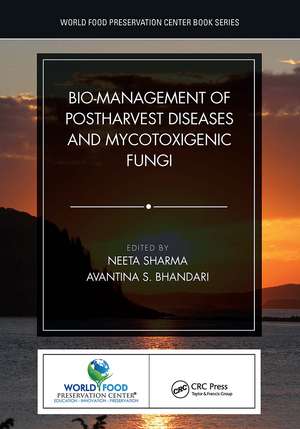Bio-management of Postharvest Diseases and Mycotoxigenic Fungi: World Food Preservation Center Book Series
Editat de Neeta Sharma, Avantina Bhandarien Limba Engleză Paperback – 29 apr 2022
Thus far, strategies employed to manage these post-harvest diseases and mycotoxins decontamination include established physical, cultural, and chemical methods. Recently, the application of chemicals to reduce decay and deterioration caused by various pathogens has been impeded as these hazardous chemicals contaminate the environment, enter the food chain, and destroy beneficial microorganisms and pests by aiming at non-target microorganisms. In light of this, the usage of eco-friendly and non-polluting alternatives to chemical pesticides is the call of the hour.
Bio-management of Postharvest Diseases and Mycotoxigenic Fungi deals with the current state and future prospects of using various bio-management techniques that are natural, eco-friendly, and environmentally safe. It aims to increase awareness of their potential as well as sensitizing readers to the various aspects of biologicals in pest control.
Key Features:
- Highlights classical versus new techniques adopted to manage postharvest diseases
- Discusses novel approaches in managing fungal spoilage and mycotoxin decontamination
- Provides readers with a 360-degree perspective of the pre- and post-harvest quality mycotoxin decontamination research being conducted
- Details proposals of new ideas to ensure a food secure and pesticide-free world
| Toate formatele și edițiile | Preț | Express |
|---|---|---|
| Paperback (1) | 485.78 lei 6-8 săpt. | |
| CRC Press – 29 apr 2022 | 485.78 lei 6-8 săpt. | |
| Hardback (1) | 1544.82 lei 6-8 săpt. | |
| CRC Press – sep 2020 | 1544.82 lei 6-8 săpt. |
Preț: 485.78 lei
Preț vechi: 650.54 lei
-25% Nou
Puncte Express: 729
Preț estimativ în valută:
92.98€ • 96.70$ • 77.92£
92.98€ • 96.70$ • 77.92£
Carte tipărită la comandă
Livrare economică 14-28 martie
Preluare comenzi: 021 569.72.76
Specificații
ISBN-13: 9780367544287
ISBN-10: 0367544288
Pagini: 312
Ilustrații: 23
Dimensiuni: 178 x 254 mm
Greutate: 0.45 kg
Ediția:1
Editura: CRC Press
Colecția CRC Press
Seria World Food Preservation Center Book Series
ISBN-10: 0367544288
Pagini: 312
Ilustrații: 23
Dimensiuni: 178 x 254 mm
Greutate: 0.45 kg
Ediția:1
Editura: CRC Press
Colecția CRC Press
Seria World Food Preservation Center Book Series
Public țintă
Professional ReferenceCuprins
Part I. Pre and Postharvest Diseases Caused By Biotic Agents and Methods for Control. Perspective on Postharvest Biocontrol: Past, Present and Future. Epiphytic Competence and Microbial Communication. Antagonist-Pathogen-Host Interactions. Discovery and Formulation Technology of Biocontrol Agents. Quality Control Commercialization of Postharvest Biocontrol Agents. Biocontrol Agents in Integrated Disease Management Program. Establishment of Biocontrol Laboratory. Part II. Mycotoxins in Food. Mycotoxin Limits in Food- Current Regulations. Mycotoxin Sampling. Emerging Technologies in Mycotoxin Analysis. Detection of Mycotoxigenic Fungi in Plants. HACCP in the Control of Mycotoxins. Control of Mycotoxins in Storage and Techniques for their Decontamination. Controlling Mycotoxins During Product Processing. Controlling Mycotoxins in Animal Feed. Study on Particular Mycotoxins: Ochratoxin A, Patulin , Zearalenone Fumonisins, Alternaria Toxins.
Descriere
This book deals with the current state and future prospects of using various bio-management techniques that are natural, eco-friendly, and environmentally safe. It aims to increase awareness of their potential as well as sensitizing the readers to the various aspects of biologicals in pest control.




